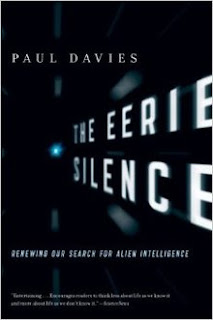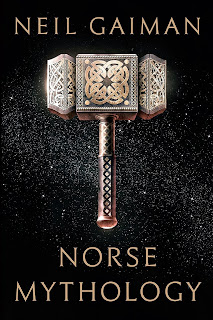A Search for Terrestrial Intelligence
The Eerie Silence
Paul Davies"Are there other people out there in the Universe?" the excited eyes of a primary school kid looking at her with a sparkle. Ellie smiles. "The most important thing is, that you all keep searching for your own anwsers. I'll tell you one thing about the universe, though. The universe is a pretty big place. It's bigger than anything anyone has ever dreamed of before. So if it's just us... it seems like an awful waste of space. Right?"
The book is about the Fermi paradox - "Where is everyone?" And it's about SETI. How do you define "life"? Not the most pertinent question here on Sol 3, which has enough life for eight planets, to borrow a phrase from Prot. But inescapable, if you're tasked with finding it elsewhere in the Universe. What exactly should you look for? And what is "intelligence"? Are we searching for extraterrestrial intelligence, because the evidence for intelligent life on Earth is highly questionable? Well, dolphins and elephants might qualify.
Paul Davies, a renowned physicist, walks the reader through the dilemmas above and many others, that SETI people are faced with. What radio spectrum to listen to? What other electromagnetic bands or signs to look for? Before he gets to any of it, though, he wisely goes through the basics of the Drake equation and the values for the different variables. So even if you've never much thought about humanity's search for companionship in the universe, you'll be eased into it gently enough.
So how do we look for life on other planets? Davies gives a good overview of all the different methods that have been used or proposed over the years. Radioastronomy is perhaps the best known, with large radio telescopes scanning the skies for signals from alien civilizations. But why look for radio signals? Well, because radio is our best means of long range communications. So in our search for aliens, we come right back down to Earth. In order to find someone, we need to look for them. And since there's very little chance of seeing them directly for now, we need to look for signs of them. Emitted gases in the atmosphere of their planet when they exhale, changes in the light of their star when they build energy harvesting superdomes around them.
This all goes from an assumption. That life on other worlds in some ways resembles life on Earth. That intelligence needs to be biological. And that intelligent creatures would follow our own curve of development, would leave signatures on their planet similar to ours.
Going right back to the elephants, then, how would we detect elephants from Alpha Centauri AB 2? They don't build mines, saturate the atmosphere with CO2, emit radio waves or laser beams and don't put rockets in the sky or space stations in orbit. The one species that does this on Earth I struggle to call intelligent.
For me, though, it was less about what was written in the book, and more about the thoughts in invoked.
For example, I'm always amused when I hear about people who practice astrobiology. I recently saw a decent documentary called "The Most Unknown", where one of the five scientists that the movie followed was a practicing astrobiologist. In the absence of known biological life on any other planet, however, what he was really doing was studying extremophiles right here on Earth. All in the hope, that one day evidence for something similar might turn up on another celestial body, inside or outside of the Solar system. Still, astrobiology is among some of the theoretical-to-the-point-of-being-amusing fields of science.
As for defining intelligence, imagine a man. He moves into a lovely, pristine 16-th century house. He doesn't own the house. Doesn't know much about it's past and isn't much interested, either. Definitely doesn't understand how it works. In a few days after having settled in he trashes it. Rips up the wooden floors to burn for warmth. Brakes the window panes for air, because he lacks the skills to open the windows. Then tries to mend the panes with tape, realising the cold gets in. Excavates the foundations in search of a treasure, destabilising the walls. Would you call such a person intelligent? Me neither.
On a final note, I'm actually writing this review many years after having read the book. It's 2018 and we know for sure, that there exist technologically advanced life forms other than homo sapiens sapiens. In 2017 the Pentagon officially released FLIR videos and testimonies from the Nimitz Encounter and the Chilean military officially released videos of a UFO encounter by one of it's border patrol helicopters. In 2018 Irish air traffic control released and the world media far and wide reported recordings of multiple commercial pilots witnessing unknown arial objects far exceeding the capabilities of terrestrial aircraft. So I dare say not only is it bloody obvious we're not alone when looking at the starry sky at night, we now also have official confirmation of it. Do we still need SETI, then? Well, we don't know of another home world and we have no (publicly) official contact by way of a signal, a delegation etc. Interesting times, then. And a good read.



Comments
Post a Comment